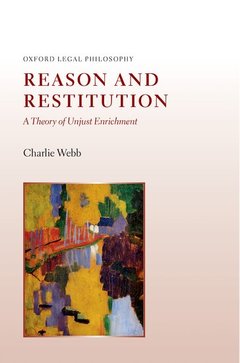Description
Reason and Restitution
A Theory of Unjust Enrichment
Oxford Legal Philosophy Series
Author: Webb Charlie
Language: English
Subjects for Reason and Restitution:
Approximative price 140.09 €
In Print (Delivery period: 21 days).
Add to cart
Publication date: 02-2016
272 p. · 16.3x23.9 cm · Hardback
272 p. · 16.3x23.9 cm · Hardback
Description
/li>Biography
/li>
In law, gains, like losses, don't always lie where they fall. The circumstances in which the law requires defendants to give up their gains are well documented in the work of unjust enrichment lawyers. The same cannot be said, however, of the reasons for ordering restitution of such gains. It is often suggested that unjust enrichment's existence can be demonstrated without inquiry into these reasons, into the principles of justice it represents and invokes. Yet while we can indeed show that there exists a body of claims dealing with the recovery of mistaken payments and the like without going on to inquire into their rationale, this isn't true of unjust enrichment's existence as a distinct ground of such claims. If unjust enrichment exists as a body of like cases and claims, truly independent of contract and tort, it does so by virtue of the distinct reasons it identifies and to which these claims respond. Reason and Restitution examines the reasons which support and shape claims in unjust enrichment and how these reasons bear on the law's resolution of these claims. The identity of these reasons matters. For one thing, unjust enrichment's status as a distinct ground of liability depends on the distinctiveness of these reasons. But, more importantly, it matters to those charged with the practical tasks of deciding cases and making laws, for it is these reasons alone which can direct how judges and legislators ought to respond to these claims.
Charlie Webb is an Associate Professor in the Law Department of the London School of Economics and Political Science. He is a graduate of Oxford, UCL, and LSE and previously taught at University College, Oxford. He writes on various aspects of private law theory.
© 2024 LAVOISIER S.A.S.
These books may interest you

The Unity of the Common Law 42.59 €



